
Vietnam and the Philippines agreed on Tuesday to boost coastguard cooperation in the South China Sea, as Manila tussles with Beijing over a hotly disputed reef.
China claims almost all of the strategic waterway in full, but the Philippines, Vietnam and several other countries claim various islands, islets, reefs and shoals.
Tensions have flared recently between Manila and Beijing over a series of confrontations between vessels from both countries, in particular around the Second Thomas Shoal, which Beijing calls the Ren’ai Shoal.
On Tuesday Philippine President Ferdinand Marcos signed two deals with Vietnam, agreeing to set up a communication hotline and work on a joint coastguard committee to discuss common issues.
“The MoU (memorandum of understanding) on maritime cooperation is aimed at strengthening the understanding, mutual trust, and confidence between the two parties,” Marcos’ office said in a statement.
Earlier this month, China held military drills in the South China Sea as the United States and the Philippines conducted their own joint exercises in the same waters.
The drills followed a month of tense standoffs between China and the Philippines in disputed reefs in the area that saw a collision between vessels from the two countries and Chinese ships blasting water cannon at Philippine boats.
During Marcos’ two-day visit, Vietnam also agreed on a five-year trade commitment to supply up to two million tonnes of white rice to the Philippines to ensure food security “amidst the impact of climate change, pandemics, and other external events”, the statement added.
Rice is a basic staple in the Philippines, but the country cannot produce enough for itself and has been one of the world’s top importers of the grain.
Prices of the grain soared to decade highs last year.
Vietnamese rice accounts for 85 percent of imported rice in the Philippines, according to official data.
Marcos also held a private meeting with Pham Nhat Vuong, CEO of Vietnamese carmaker VinFast.
The communist state’s first homegrown car manufacturer said it plans to invest in the Philippines in 2024, beginning with the establishment of a network of electric car and motorcycle dealerships.
The Philippines also hopes to participate in the electric vehicle battery supply chain, working with its “abundant reserves of cobalt, copper and nickel”, Marcos said.








